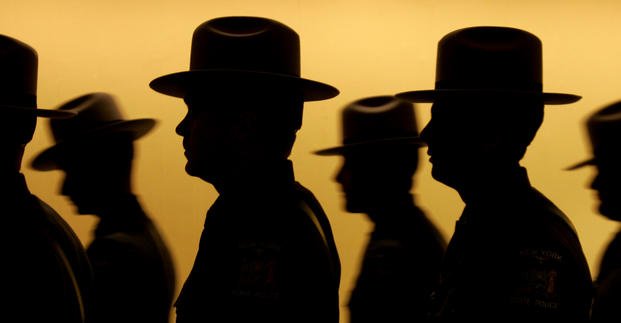This article first appeared on Spytalk.co.
The arrest in New York last week of an Egyptian-American accused of spying on exiles opposed to President Abdel Fattah al-Sisi's repressive regime has lifted the curtain on a "significant" but little noted national security issue: the recruitment of U.S. state and local police by foreign intelligence agencies.
Pierre Girgis, a dual Egyptian-U.S. citizen in Manhattan, worked at the "direction and control" of several Cairo agencies to advance the regime's interests in the United States from 2014 through 2019, according to a federal indictment handed down Jan. 6.
Girgis, a Capital One bank vice president who openly promoted interchanges between Egyptian officials and American police, had a secret helper, according to the Justice Department: a source in local law enforcement. FBI wiretaps overheard Girgis and Egyptian officials talking about exploiting the (unnamed) police officer for private information on anti-regime activists here.
The Girgis case is hardly atypical, law enforcement sources say. The full number and disposition of such cases in recent years was not readily available from the Justice Department, but according to former FBI counterintelligence chief Frank Figliuzzi and other former national security officials, efforts by foreign spy agencies to recruit U.S. state and local police is a persistent problem.
"Certain foreign intelligence services consistently seek to recruit American police officers for their access to non-public information" which helps them track down dissidents here, Figliuzzi told SpyTalk. "This continues to be a significant concern."
In 2020, an NYPD officer of Tibetan descent was charged with helping China with its "intelligence gathering and repression of Chinese abroad," particularly anti-communist Tibetans in New York and elsewhere.
Last July, five Iranian agents were charged in Manhattan with plotting to kidnap an Brooklyn-based Iranian-American journalist and human rights activist and smuggle her to Venezuela and onward to Tehran. The plotters employed unidentified "private investigators" to spy on her, the indictment said. Typically, private eyes are ex-cops with sources in their old police outfits.
"Throughout my career, local police and state police officers have been a target of numerous foreign intelligence services," Figliuzzi said, "where they get access to nonpublic information." The regimes' secret police want to know "where is this dissident living? What are his family members' names? Where does he work? They've even perhaps paid off-duty police officers to do surveillance of dissidents." Activists regularly report being followed around, sometimes by local police cars.
Figliuzzi said he had personally encountered cases of Chinese, Cuban, Turkish and Israeli agents cultivating local American police.
"I can go back 20 years on this issue," Bill Evanina, a former top U.S. counterintelligence and counterespionage official, also told SpyTalk. It's not a "WMD level issue," he said, but a worrisome national security threat.
"The Chinese have perfected it," Evanina said, often via regular, above-board law enforcement exchanges between their police and security agencies and ours.
Evanina singled out China's Ministry of State Security, or MSS, and its Shanghai Security Bureau, "coming over here and offering partnerships with state and local law enforcement to do training and [to] understand their systems and capabilities. And then they kind of co-opt someone who's usually in the administrative department to get access to records and data."
Eventually, Evanina told SpyTalk, they'll reach out to a U.S. police contact and say, "Hey, listen, uh, we're looking for a fugitive and his name is Joe Chen. And we think he might be in your state." U.S. cops will help, he said, because they generally think any foreign counterparts are just like them -- "on the up and up. They have no reason to believe otherwise."
In 2014, China launched Operation Foxhunt, a global covert action program to track down and repatriate criminal fugitives and overseas dissidents. They are often one and the same in Beijing's eyes. "It's really, really bad," Evanina said, with Chinese agents often resorting to brazen kidnappings. They look for opportunities to cultivate sources in U.S. police departments to help them track down targets.
Likewise, the Russians take a long range approach to penetrating our local police, Evanina said. The Russians have been "very good at seeding their people" -- sons and daughters of immigrants -- "in police departments in the Sun Coast of Florida, New York and D.C.," where there are sizable Russian communities, Evanina said.
"They would love to get their hands on a defector."
But they're not just gathering data on enemies of the state, he said.
The Russian infiltration of police departments also has "organized crime purposes," including "white slavery," trafficking women as sex workers, especially through strip clubs. "There's one part of Florida that's just Russian town after Russian town, right? They get in as a lower level police officer or trainee or administrative aide and then, 10 years later, they're in a position of prominence." (In 2017, a local business magazine reported, "Russia Again Tops List of Countries Searching for South Florida Real Estate.")
As the Girgis case demonstrates, friendly but autocratic regimes, not just U.S. adversaries, are aggressive in recruiting contacts among American police departments. One tool is through "police tourism," offering paid junkets for U.S. state and local police to tour historic sites, all the while cultivating useful contracts in a relaxed, often boozy, setting. Turkey and Egypt are particularly aggressive suitors, Figliuzzi and Evanina say.
As It turns out, none other than Pierre Girgis was instrumental in organizing a 2018. junket to Egypt for about 100 NYPD and Nassau County police officers, "which allowed New York's Finest to see Egypt in a different light," according to an effusive article in the marketing section of Ink.com. "Law enforcement," the piece noted, "are important influencers," who can bring home a positive view of the al-Sisi regime, which regularly rounds up and tortures civil rights activists and journalists. At least one NYPD source agreed to help Girgis track dissidents here, according to his indictment.
Junkets are "something used strategically by foreign governments to get cops to travel abroad, under the guise of 'learning how we do law enforcement here,' Figliuzzi said. "They'll say, "Let's have a better relationship, a sister city relationship…and more, [with] your police' And we're talking about at a high level…"
"I could probably name eight countries that do this selectively," said Evanina.
"It gets even more nefarious than that," Figliuzzi said. Foreign security and intelligence organizations, particularly in Turkey and Israel, routinely invite senior state and municipal law enforcement officials for extended, all-paid visits, which are "designed to kind of get really close to various police chiefs throughout small-town, mid-town America and major city chiefs." They're also watching the Americans closely for blackmail opportunities.
"Shame on any high level police officer that doesn't understand that there's cameras in his hotel room, and that there'll be attempts to compromise him" with drugs, women or other enticements, Figliuzzi said. "That absolutely will be the case. And then they will feel beholden."
The U.S.-based International Association of Chiefs of Police did not respond to an emailed request for comment.
The FBI has spent "two decades trying to warn state local law enforcement," Evanina said, with the help of national law enforcement organizations. But it's been an uphill battle, with some 18,000 police departments across the country, most with little clue to the designs of foreign adversaries or the resources to vet them. They're easy prey for foreign agents pretending to be regular, friendly police officers.
"I can no longer count the number of chiefs of police or assistant chiefs in this country I've run into who tell me they've been to Turkey and it's a beautiful place," Figliuzzi said, ruefully.
The same could be said for Egypt, for which, until Jan. 6, Pierre Girgis was surely at work for on more junkets for the NYPD.
Listen to the entire interview of Frank Figliuzzi on the SpyTalk podcast.













